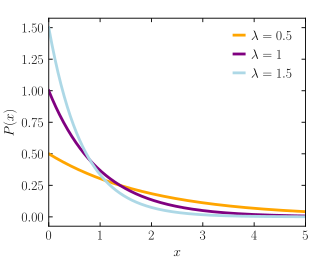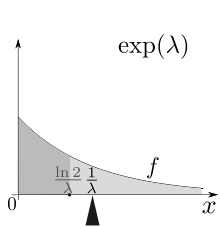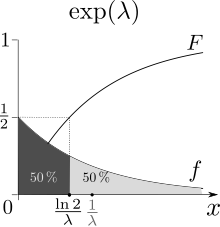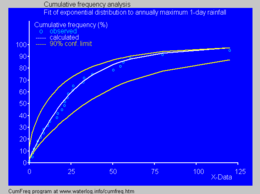From Wikipedia, the free encyclopedia
In probability theory and statistics, the exponential distribution is the probability distribution of the time between events in a Poisson point process,
i.e., a process in which events occur continuously and independently at
a constant average rate. It is a particular case of the gamma distribution. It is the continuous analogue of the geometric distribution, and it has the key property of being memoryless. In addition to being used for the analysis of Poisson point processes it is found in various other contexts.
The exponential distribution is not the same as the class of exponential families
of distributions, which is a large class of probability distributions
that includes the exponential distribution as one of its members, but
also includes the normal distribution, binomial distribution, gamma distribution, Poisson, and many others.
Definitions
Probability density function
The probability density function (pdf) of an exponential distribution is

Here λ > 0 is the parameter of the distribution, often called the rate parameter. The distribution is supported on the interval [0, ∞). If a random variable X has this distribution, we write X ~ Exp(λ).
The exponential distribution exhibits infinite divisibility.
Cumulative distribution function
The cumulative distribution function is given by

Alternative parametrization
The exponential distribution is sometimes parametrized in terms of the scale parameter β = 1/λ, which is also the mean:

Properties
Mean, variance, moments, and median
The mean is the probability mass centre, that is, the
first moment.
The mean or expected value of an exponentially distributed random variable X with rate parameter λ is given by
![{\displaystyle \operatorname {E} [X]={\frac {1}{\lambda }}.}](https://wikimedia.org/api/rest_v1/media/math/render/svg/f9efa3ce3c964c59532609b3d6b8f01ce88f6221)
In light of the examples given below,
this makes sense: if you receive phone calls at an average rate of 2
per hour, then you can expect to wait half an hour for every call.
The variance of X is given by
![{\displaystyle \operatorname {Var} [X]={\frac {1}{\lambda ^{2}}},}](https://wikimedia.org/api/rest_v1/media/math/render/svg/3c450db5013b1cfdaf5ea71106c9d13834e02d61)
so the
standard deviation is equal to the mean.
The moments of X, for  are given by
are given by
![{\displaystyle \operatorname {E} \left[X^{n}\right]={\frac {n!}{\lambda ^{n}}}.}](https://wikimedia.org/api/rest_v1/media/math/render/svg/5f5d3a82fbcff5a294e5360fb05b1e5f2166ec09)
The central moments of X, for  are given by
are given by

where !
n is the
subfactorial of
n
The median of X is given by
![{\displaystyle \operatorname {m} [X]={\frac {\ln(2)}{\lambda }}<\operatorname {E} [X],}](https://wikimedia.org/api/rest_v1/media/math/render/svg/7f19becbfbc702d8c33a9698c779384fe3f4dca1)
where
ln refers to the
natural logarithm. Thus the
absolute difference between the mean and median is
![{\displaystyle \left|\operatorname {E} \left[X\right]-\operatorname {m} \left[X\right]\right|={\frac {1-\ln(2)}{\lambda }}<{\frac {1}{\lambda }}=\operatorname {\sigma } [X],}](https://wikimedia.org/api/rest_v1/media/math/render/svg/e48a50d7c835e2c16f59682fe49712aa41a54d8a)
in accordance with the median-mean inequality.
Memorylessness
An exponentially distributed random variable T obeys the relation

This can be seen by considering the complementary cumulative distribution function:
![{\displaystyle {\begin{aligned}\Pr \left(T>s+t\mid T>s\right)&={\frac {\Pr \left(T>s+t\cap T>s\right)}{\Pr \left(T>s\right)}}\\[4pt]&={\frac {\Pr \left(T>s+t\right)}{\Pr \left(T>s\right)}}\\[4pt]&={\frac {e^{-\lambda (s+t)}}{e^{-\lambda s}}}\\[4pt]&=e^{-\lambda t}\\[4pt]&=\Pr(T>t).\end{aligned}}}](https://wikimedia.org/api/rest_v1/media/math/render/svg/126da1213459cde98ae372eae857a18183675f5a)
When T is interpreted as the waiting time for an event to occur relative to some initial time, this relation implies that, if T is conditioned on a failure to observe the event over some initial period of time s,
the distribution of the remaining waiting time is the same as the
original unconditional distribution. For example, if an event has not
occurred after 30 seconds, the conditional probability
that occurrence will take at least 10 more seconds is equal to the
unconditional probability of observing the event more than 10 seconds
after the initial time.
The exponential distribution and the geometric distribution are the only memoryless probability distributions.
The exponential distribution is consequently also necessarily the only continuous probability distribution that has a constant failure rate.
Quantiles
Tukey criteria for anomalies.
The quantile function (inverse cumulative distribution function) for Exp(λ) is

The quartiles are therefore:
- first quartile: ln(4/3)/λ
- median: ln(2)/λ
- third quartile: ln(4)/λ
And as a consequence the interquartile range is ln(3)/λ.
Kullback–Leibler divergence
The directed Kullback–Leibler divergence in nats of  ("approximating" distribution) from
("approximating" distribution) from  ('true' distribution) is given by
('true' distribution) is given by

Maximum entropy distribution
Among all continuous probability distributions with support [0, ∞) and mean μ, the exponential distribution with λ = 1/μ has the largest differential entropy. In other words, it is the maximum entropy probability distribution for a random variate X which is greater than or equal to zero and for which E[X] is fixed.
Distribution of the minimum of exponential random variables
Let X1, …, Xn be independent exponentially distributed random variables with rate parameters λ1, …, λn. Then

is also exponentially distributed, with parameter

This can be seen by considering the complementary cumulative distribution function:

The index of the variable which achieves the minimum is distributed according to the categorical distribution

A proof can be seen by letting  . Then,
. Then,

Note that

is not exponentially distributed, if
X1, …,
Xn do not all have parameter 0.
Joint moments of i.i.d. exponential order statistics
Let  be
be  independent and identically distributed exponential random variables with rate parameter λ.
Let
independent and identically distributed exponential random variables with rate parameter λ.
Let  denote the corresponding order statistics.
For
denote the corresponding order statistics.
For  , the joint moment
, the joint moment ![{\displaystyle \operatorname {E} \left[X_{(i)}X_{(j)}\right]}](https://wikimedia.org/api/rest_v1/media/math/render/svg/7d350557a602c2566c092558fff0aefb0049c7c9) of the order statistics
of the order statistics  and
and  is given by
is given by
![{\displaystyle {\begin{aligned}\operatorname {E} \left[X_{(i)}X_{(j)}\right]&=\sum _{k=0}^{j-1}{\frac {1}{(n-k)\lambda }}\operatorname {E} \left[X_{(i)}\right]+\operatorname {E} \left[X_{(i)}^{2}\right]\\&=\sum _{k=0}^{j-1}{\frac {1}{(n-k)\lambda }}\sum _{k=0}^{i-1}{\frac {1}{(n-k)\lambda }}+\sum _{k=0}^{i-1}{\frac {1}{((n-k)\lambda )^{2}}}+\left(\sum _{k=0}^{i-1}{\frac {1}{(n-k)\lambda }}\right)^{2}.\end{aligned}}}](https://wikimedia.org/api/rest_v1/media/math/render/svg/0135f144a56c4b7565f7faa61cc3abb42afe9c0d)
This can be seen by invoking the law of total expectation and the memoryless property:
![{\displaystyle {\begin{aligned}\operatorname {E} \left[X_{(i)}X_{(j)}\right]&=\int _{0}^{\infty }\operatorname {E} \left[X_{(i)}X_{(j)}\mid X_{(i)}=x\right]f_{X_{(i)}}(x)\,dx\\&=\int _{x=0}^{\infty }x\operatorname {E} \left[X_{(j)}\mid X_{(j)}\geq x\right]f_{X_{(i)}}(x)\,dx&&\left({\textrm {since}}~X_{(i)}=x\implies X_{(j)}\geq x\right)\\&=\int _{x=0}^{\infty }x\left[\operatorname {E} \left[X_{(j)}\right]+x\right]f_{X_{(i)}}(x)\,dx&&\left({\text{by the memoryless property}}\right)\\&=\sum _{k=0}^{j-1}{\frac {1}{(n-k)\lambda }}\operatorname {E} \left[X_{(i)}\right]+\operatorname {E} \left[X_{(i)}^{2}\right].\end{aligned}}}](https://wikimedia.org/api/rest_v1/media/math/render/svg/be5949313f3639a86ac81484ac8ca7f4f9edb4d4)
The first equation follows from the law of total expectation.
The second equation exploits the fact that once we condition on  , it must follow that
, it must follow that  . The third equation relies on the memoryless property to replace
. The third equation relies on the memoryless property to replace ![{\displaystyle \operatorname {E} \left[X_{(j)}\mid X_{(j)}\geq x\right]}](https://wikimedia.org/api/rest_v1/media/math/render/svg/00169b33907d379235fd4561c63c13d4c51a619a) with
with ![{\displaystyle \operatorname {E} \left[X_{(j)}\right]+x}](https://wikimedia.org/api/rest_v1/media/math/render/svg/775aa6cfd6c5d2b1e4b70ce3108a17f93f7b0224) .
.
Sum of two independent exponential random variables
The probability distribution function (PDF) of a sum of two independent random variables is the convolution of their individual PDFs. If  and
and  are independent exponential random variables with respective rate parameters
are independent exponential random variables with respective rate parameters  and
and  then the probability density of
then the probability density of  is given by
is given by
![{\displaystyle {\begin{aligned}f_{Z}(z)&=\int _{-\infty }^{\infty }f_{X_{1}}(x_{1})f_{X_{2}}(z-x_{1})\,dx_{1}\\&=\int _{0}^{z}\lambda _{1}e^{-\lambda _{1}x_{1}}\lambda _{2}e^{-\lambda _{2}(z-x_{1})}\,dx_{1}\\&=\lambda _{1}\lambda _{2}e^{-\lambda _{2}z}\int _{0}^{z}e^{(\lambda _{2}-\lambda _{1})x_{1}}\,dx_{1}\\&={\begin{cases}{\dfrac {\lambda _{1}\lambda _{2}}{\lambda _{2}-\lambda _{1}}}\left(e^{-\lambda _{1}z}-e^{-\lambda _{2}z}\right)&{\text{ if }}\lambda _{1}\neq \lambda _{2}\\[4pt]\lambda ^{2}ze^{-\lambda z}&{\text{ if }}\lambda _{1}=\lambda _{2}=\lambda .\end{cases}}\end{aligned}}}](https://wikimedia.org/api/rest_v1/media/math/render/svg/c2db15dda49fe8482485a68c9d7c9b1c1d46ee95)
The entropy of this distribution is available in closed form: assuming

(without loss of generality), then

where

is the
Euler-Mascheroni constant, and

is the
digamma function.
In the case of equal rate parameters, the result is an Erlang distribution with shape 2 and parameter  which in turn is a special case of gamma distribution.
which in turn is a special case of gamma distribution.
Related distributions
- If X ~ Laplace(μ, β-1), then |X − μ| ~ Exp(β).
- If X ~ Pareto(1, λ), then log(X) ~ Exp(λ).
- If X ~ SkewLogistic(θ), then
 .
. - If Xi ~ U(0, 1) then

- The exponential distribution is a limit of a scaled beta distribution:

- Exponential distribution is a special case of type 3 Pearson distribution.
- If X ~ Exp(λ) and Xi ~ Exp(λi) then:
 , closure under scaling by a positive factor.
, closure under scaling by a positive factor.- 1 + X ~ BenktanderWeibull(λ, 1), which reduces to a truncated exponential distribution.
- keX ~ Pareto(k, λ).
- e−X ~ Beta(λ, 1).
- 1/keX ~ PowerLaw(k, λ)
 , the Rayleigh distribution
, the Rayleigh distribution , the Weibull distribution
, the Weibull distribution
- μ − β log(λX) ∼ Gumbel(μ, β).
 , a geometric distribution on 0,1,2,3,...
, a geometric distribution on 0,1,2,3,... , a geometric distribution on 1,2,3,4,...
, a geometric distribution on 1,2,3,4,...- If also Y ~ Erlang(n, λ) or
 then
then 
- If also λ ~ Gamma(k, θ) (shape, scale parametrisation) then the marginal distribution of X is Lomax(k, 1/θ), the gamma mixture
- λ1X1 − λ2Y2 ~ Laplace(0, 1).
- min{X1, ..., Xn} ~ Exp(λ1 + ... + λn).
- If also λi = λ then:
 Erlang(k, λ) = Gamma(k, λ−1) = Gamma(k, λ) (in (k, θ) and (α, β) parametrization, respectively) with an integer shape parameter k.
Erlang(k, λ) = Gamma(k, λ−1) = Gamma(k, λ) (in (k, θ) and (α, β) parametrization, respectively) with an integer shape parameter k.- Xi − Xj ~ Laplace(0, λ−1).
- If also Xi are independent, then:
 ~ U(0, 1)
~ U(0, 1) has probability density function
has probability density function  . This can be used to obtain a confidence interval for
. This can be used to obtain a confidence interval for  .
.
- If also λ = 1:
 , the logistic distribution
, the logistic distribution
- μ − σ log(X) ~ GEV(μ, σ, 0).
- Further if
 then
then  (K-distribution)
(K-distribution)
- If also λ = 1/2 then X ∼ χ2
2; i.e., X has a chi-squared distribution with 2 degrees of freedom. Hence: 
- If
 and
and  ~ Poisson(X) then
~ Poisson(X) then  (geometric distribution)
(geometric distribution) - The Hoyt distribution can be obtained from exponential distribution and arcsine distribution
- The exponential distribution is a limit of the κ-exponential distribution in the
 case.
case. - Exponential distribution is a limit of the κ-Generalized Gamma distribution in the
 and
and  cases:
cases:

Other related distributions:
Statistical inference
Below, suppose random variable X is exponentially distributed with rate parameter λ, and  are n independent samples from X, with sample mean
are n independent samples from X, with sample mean  .
.
Parameter estimation
The maximum likelihood estimator for λ is constructed as follows.
The likelihood function for λ, given an independent and identically distributed sample x = (x1, …, xn) drawn from the variable, is:

where:

is the sample mean.
The derivative of the likelihood function's logarithm is:
![{\displaystyle {\frac {d}{d\lambda }}\ln L(\lambda )={\frac {d}{d\lambda }}\left(n\ln \lambda -\lambda n{\overline {x}}\right)={\frac {n}{\lambda }}-n{\overline {x}}\ {\begin{cases}>0,&0<\lambda <{\frac {1}{\overline {x}}},\\[8pt]=0,&\lambda ={\frac {1}{\overline {x}}},\\[8pt]<0,&\lambda >{\frac {1}{\overline {x}}}.\end{cases}}}](https://wikimedia.org/api/rest_v1/media/math/render/svg/65ec59bc9ccff1952291621e3eccc741ee1341a2)
Consequently, the maximum likelihood estimate for the rate parameter is:

This is not an unbiased estimator of  although
although  is an unbiased MLE estimator of
is an unbiased MLE estimator of  and the distribution mean.
and the distribution mean.
The bias of  is equal to
is equal to
![{\displaystyle B\equiv \operatorname {E} \left[\left({\widehat {\lambda }}_{\text{mle}}-\lambda \right)\right]={\frac {\lambda }{n-1}}}](https://wikimedia.org/api/rest_v1/media/math/render/svg/e6df9c9d7b6d1a8ffc31748e7cdf0cc750b442e4)
which yields the
bias-corrected maximum likelihood estimator

An approximate minimizer of mean squared error (see also: bias–variance tradeoff) can be found, assuming a sample size greater than two, with a correction factor to the MLE:

This is derived from the mean and variance of the
inverse-gamma distribution,

.
Fisher information
The Fisher information, denoted  , for an estimator of the rate parameter
, for an estimator of the rate parameter  is given as:
is given as:
![{\displaystyle {\mathcal {I}}(\lambda )=\operatorname {E} \left[\left.\left({\frac {\partial }{\partial \lambda }}\log f(x;\lambda )\right)^{2}\right|\lambda \right]=\int \left({\frac {\partial }{\partial \lambda }}\log f(x;\lambda )\right)^{2}f(x;\lambda )\,dx}](https://wikimedia.org/api/rest_v1/media/math/render/svg/2c70bd835b54bb1b7f344dbf1f04d170bd1d4852)
Plugging in the distribution and solving gives:

This determines the amount of information each independent
sample of an exponential distribution carries about the unknown rate
parameter  .
.
Confidence intervals
The 100(1 − α)% confidence interval for the rate parameter of an exponential distribution is given by:

which is also equal to:

where
χ2
p,v is the
100(p) percentile of the
chi squared distribution with
v degrees of freedom,
n is the number of observations of inter-arrival times in the sample,
and x-bar is the sample average. A simple approximation to the exact
interval endpoints can be derived using a normal approximation to the
χ2
p,v distribution. This approximation gives the following values for a 95% confidence interval:

This approximation may be acceptable for samples containing at least 15 to 20 elements.
Bayesian inference
The conjugate prior for the exponential distribution is the gamma distribution
(of which the exponential distribution is a special case). The
following parameterization of the gamma probability density function is
useful:

The posterior distribution p can then be expressed in terms of the likelihood function defined above and a gamma prior:

Now the posterior density p has been specified up to a
missing normalizing constant. Since it has the form of a gamma pdf,
this can easily be filled in, and one obtains:

Here the hyperparameter α can be interpreted as the number of prior observations, and β as the sum of the prior observations.
The posterior mean here is:

Occurrence and applications
Occurrence of events
The exponential distribution occurs naturally when describing the lengths of the inter-arrival times in a homogeneous Poisson process.
The exponential distribution may be viewed as a continuous counterpart of the geometric distribution, which describes the number of Bernoulli trials necessary for a discrete process to change state. In contrast, the exponential distribution describes the time for a continuous process to change state.
In real-world scenarios, the assumption of a constant rate (or
probability per unit time) is rarely satisfied. For example, the rate of
incoming phone calls differs according to the time of day. But if we
focus on a time interval during which the rate is roughly constant, such
as from 2 to 4 p.m. during work days, the exponential distribution can
be used as a good approximate model for the time until the next phone
call arrives. Similar caveats apply to the following examples which
yield approximately exponentially distributed variables:
- The time until a radioactive particle decays, or the time between clicks of a Geiger counter
- The time it takes before your next telephone call
- The time until default (on payment to company debt holders) in reduced-form credit risk modeling
Exponential variables can also be used to model situations where
certain events occur with a constant probability per unit length, such
as the distance between mutations on a DNA strand, or between roadkills on a given road.
In queuing theory,
the service times of agents in a system (e.g. how long it takes for a
bank teller etc. to serve a customer) are often modeled as exponentially
distributed variables. (The arrival of customers for instance is also
modeled by the Poisson distribution
if the arrivals are independent and distributed identically.) The
length of a process that can be thought of as a sequence of several
independent tasks follows the Erlang distribution (which is the distribution of the sum of several independent exponentially distributed variables).
Reliability theory and reliability engineering also make extensive use of the exponential distribution. Because of the memoryless property of this distribution, it is well-suited to model the constant hazard rate portion of the bathtub curve used in reliability theory. It is also very convenient because it is so easy to add failure rates
in a reliability model. The exponential distribution is however not
appropriate to model the overall lifetime of organisms or technical
devices, because the "failure rates" here are not constant: more
failures occur for very young and for very old systems.
Fitted cumulative exponential distribution to annually maximum 1-day rainfalls using
CumFreqIn physics, if you observe a gas at a fixed temperature and pressure in a uniform gravitational field, the heights of the various molecules also follow an approximate exponential distribution, known as the Barometric formula. This is a consequence of the entropy property mentioned below.
In hydrology,
the exponential distribution is used to analyze extreme values of such
variables as monthly and annual maximum values of daily rainfall and
river discharge volumes.
- The blue picture illustrates an example of fitting the
exponential distribution to ranked annually maximum one-day rainfalls
showing also the 90% confidence belt based on the binomial distribution. The rainfall data are represented by plotting positions as part of the cumulative frequency analysis.
In operating-rooms management, the distribution of surgery duration for a category of surgeries with no typical work-content (like in an emergency room, encompassing all types of surgeries).
Prediction
Having observed a sample of n data points from an unknown
exponential distribution a common task is to use these samples to make
predictions about future data from the same source. A common predictive
distribution over future samples is the so-called plug-in distribution,
formed by plugging a suitable estimate for the rate parameter λ
into the exponential density function. A common choice of estimate is
the one provided by the principle of maximum likelihood, and using this
yields the predictive density over a future sample xn+1, conditioned on the observed samples x = (x1, ..., xn) given by

The Bayesian approach provides a predictive distribution which
takes into account the uncertainty of the estimated parameter, although
this may depend crucially on the choice of prior.
A predictive distribution free of the issues of choosing priors that arise under the subjective Bayesian approach is

which can be considered as
- a frequentist confidence distribution, obtained from the distribution of the pivotal quantity
 ;
; - a profile predictive likelihood, obtained by eliminating the parameter λ from the joint likelihood of xn+1 and λ by maximization;
- an objective Bayesian predictive posterior distribution, obtained using the non-informative Jeffreys prior 1/λ;
- the Conditional Normalized Maximum Likelihood (CNML) predictive distribution, from information theoretic considerations.
The accuracy of a predictive distribution may be measured using the
distance or divergence between the true exponential distribution with
rate parameter, λ0, and the predictive distribution based on the sample x. The Kullback–Leibler divergence is a commonly used, parameterisation free measure of the difference between two distributions. Letting Δ(λ0||p) denote the Kullback–Leibler divergence between an exponential with rate parameter λ0 and a predictive distribution p it can be shown that
![{\displaystyle {\begin{aligned}\operatorname {E} _{\lambda _{0}}\left[\Delta (\lambda _{0}\parallel p_{\rm {ML}})\right]&=\psi (n)+{\frac {1}{n-1}}-\log(n)\\\operatorname {E} _{\lambda _{0}}\left[\Delta (\lambda _{0}\parallel p_{\rm {CNML}})\right]&=\psi (n)+{\frac {1}{n}}-\log(n)\end{aligned}}}](https://wikimedia.org/api/rest_v1/media/math/render/svg/02702bfd262096d01f27b67eab961ff7ccb512a9)
where the expectation is taken with respect to the exponential distribution with rate parameter λ0 ∈ (0, ∞), and ψ( · )
is the digamma function. It is clear that the CNML predictive
distribution is strictly superior to the maximum likelihood plug-in
distribution in terms of average Kullback–Leibler divergence for all
sample sizes n > 0.
Random variate generation
A conceptually very simple method for generating exponential variates is based on inverse transform sampling: Given a random variate U drawn from the uniform distribution on the unit interval (0, 1), the variate

has an exponential distribution, where F−1 is the quantile function, defined by

Moreover, if U is uniform on (0, 1), then so is 1 − U. This means one can generate exponential variates as follows:

Other methods for generating exponential variates are discussed by Knuth and Devroye.
A fast method for generating a set of ready-ordered exponential variates without using a sorting routine is also available.






















![{\displaystyle \operatorname {E} [X]={\frac {1}{\lambda }}.}](https://wikimedia.org/api/rest_v1/media/math/render/svg/f9efa3ce3c964c59532609b3d6b8f01ce88f6221)
![{\displaystyle \operatorname {Var} [X]={\frac {1}{\lambda ^{2}}},}](https://wikimedia.org/api/rest_v1/media/math/render/svg/3c450db5013b1cfdaf5ea71106c9d13834e02d61)

![{\displaystyle \operatorname {E} \left[X^{n}\right]={\frac {n!}{\lambda ^{n}}}.}](https://wikimedia.org/api/rest_v1/media/math/render/svg/5f5d3a82fbcff5a294e5360fb05b1e5f2166ec09)

![{\displaystyle \operatorname {m} [X]={\frac {\ln(2)}{\lambda }}<\operatorname {E} [X],}](https://wikimedia.org/api/rest_v1/media/math/render/svg/7f19becbfbc702d8c33a9698c779384fe3f4dca1)
![{\displaystyle \left|\operatorname {E} \left[X\right]-\operatorname {m} \left[X\right]\right|={\frac {1-\ln(2)}{\lambda }}<{\frac {1}{\lambda }}=\operatorname {\sigma } [X],}](https://wikimedia.org/api/rest_v1/media/math/render/svg/e48a50d7c835e2c16f59682fe49712aa41a54d8a)

![{\displaystyle {\begin{aligned}\Pr \left(T>s+t\mid T>s\right)&={\frac {\Pr \left(T>s+t\cap T>s\right)}{\Pr \left(T>s\right)}}\\[4pt]&={\frac {\Pr \left(T>s+t\right)}{\Pr \left(T>s\right)}}\\[4pt]&={\frac {e^{-\lambda (s+t)}}{e^{-\lambda s}}}\\[4pt]&=e^{-\lambda t}\\[4pt]&=\Pr(T>t).\end{aligned}}}](https://wikimedia.org/api/rest_v1/media/math/render/svg/126da1213459cde98ae372eae857a18183675f5a)
















![{\displaystyle \operatorname {E} \left[X_{(i)}X_{(j)}\right]}](https://wikimedia.org/api/rest_v1/media/math/render/svg/7d350557a602c2566c092558fff0aefb0049c7c9)


![{\displaystyle {\begin{aligned}\operatorname {E} \left[X_{(i)}X_{(j)}\right]&=\sum _{k=0}^{j-1}{\frac {1}{(n-k)\lambda }}\operatorname {E} \left[X_{(i)}\right]+\operatorname {E} \left[X_{(i)}^{2}\right]\\&=\sum _{k=0}^{j-1}{\frac {1}{(n-k)\lambda }}\sum _{k=0}^{i-1}{\frac {1}{(n-k)\lambda }}+\sum _{k=0}^{i-1}{\frac {1}{((n-k)\lambda )^{2}}}+\left(\sum _{k=0}^{i-1}{\frac {1}{(n-k)\lambda }}\right)^{2}.\end{aligned}}}](https://wikimedia.org/api/rest_v1/media/math/render/svg/0135f144a56c4b7565f7faa61cc3abb42afe9c0d)
![{\displaystyle {\begin{aligned}\operatorname {E} \left[X_{(i)}X_{(j)}\right]&=\int _{0}^{\infty }\operatorname {E} \left[X_{(i)}X_{(j)}\mid X_{(i)}=x\right]f_{X_{(i)}}(x)\,dx\\&=\int _{x=0}^{\infty }x\operatorname {E} \left[X_{(j)}\mid X_{(j)}\geq x\right]f_{X_{(i)}}(x)\,dx&&\left({\textrm {since}}~X_{(i)}=x\implies X_{(j)}\geq x\right)\\&=\int _{x=0}^{\infty }x\left[\operatorname {E} \left[X_{(j)}\right]+x\right]f_{X_{(i)}}(x)\,dx&&\left({\text{by the memoryless property}}\right)\\&=\sum _{k=0}^{j-1}{\frac {1}{(n-k)\lambda }}\operatorname {E} \left[X_{(i)}\right]+\operatorname {E} \left[X_{(i)}^{2}\right].\end{aligned}}}](https://wikimedia.org/api/rest_v1/media/math/render/svg/be5949313f3639a86ac81484ac8ca7f4f9edb4d4)


![{\displaystyle \operatorname {E} \left[X_{(j)}\mid X_{(j)}\geq x\right]}](https://wikimedia.org/api/rest_v1/media/math/render/svg/00169b33907d379235fd4561c63c13d4c51a619a)
![{\displaystyle \operatorname {E} \left[X_{(j)}\right]+x}](https://wikimedia.org/api/rest_v1/media/math/render/svg/775aa6cfd6c5d2b1e4b70ce3108a17f93f7b0224)





![{\displaystyle {\begin{aligned}f_{Z}(z)&=\int _{-\infty }^{\infty }f_{X_{1}}(x_{1})f_{X_{2}}(z-x_{1})\,dx_{1}\\&=\int _{0}^{z}\lambda _{1}e^{-\lambda _{1}x_{1}}\lambda _{2}e^{-\lambda _{2}(z-x_{1})}\,dx_{1}\\&=\lambda _{1}\lambda _{2}e^{-\lambda _{2}z}\int _{0}^{z}e^{(\lambda _{2}-\lambda _{1})x_{1}}\,dx_{1}\\&={\begin{cases}{\dfrac {\lambda _{1}\lambda _{2}}{\lambda _{2}-\lambda _{1}}}\left(e^{-\lambda _{1}z}-e^{-\lambda _{2}z}\right)&{\text{ if }}\lambda _{1}\neq \lambda _{2}\\[4pt]\lambda ^{2}ze^{-\lambda z}&{\text{ if }}\lambda _{1}=\lambda _{2}=\lambda .\end{cases}}\end{aligned}}}](https://wikimedia.org/api/rest_v1/media/math/render/svg/c2db15dda49fe8482485a68c9d7c9b1c1d46ee95)





































![{\displaystyle {\frac {d}{d\lambda }}\ln L(\lambda )={\frac {d}{d\lambda }}\left(n\ln \lambda -\lambda n{\overline {x}}\right)={\frac {n}{\lambda }}-n{\overline {x}}\ {\begin{cases}>0,&0<\lambda <{\frac {1}{\overline {x}}},\\[8pt]=0,&\lambda ={\frac {1}{\overline {x}}},\\[8pt]<0,&\lambda >{\frac {1}{\overline {x}}}.\end{cases}}}](https://wikimedia.org/api/rest_v1/media/math/render/svg/65ec59bc9ccff1952291621e3eccc741ee1341a2)




![{\displaystyle B\equiv \operatorname {E} \left[\left({\widehat {\lambda }}_{\text{mle}}-\lambda \right)\right]={\frac {\lambda }{n-1}}}](https://wikimedia.org/api/rest_v1/media/math/render/svg/e6df9c9d7b6d1a8ffc31748e7cdf0cc750b442e4)





![{\displaystyle {\mathcal {I}}(\lambda )=\operatorname {E} \left[\left.\left({\frac {\partial }{\partial \lambda }}\log f(x;\lambda )\right)^{2}\right|\lambda \right]=\int \left({\frac {\partial }{\partial \lambda }}\log f(x;\lambda )\right)^{2}f(x;\lambda )\,dx}](https://wikimedia.org/api/rest_v1/media/math/render/svg/2c70bd835b54bb1b7f344dbf1f04d170bd1d4852)












![{\displaystyle {\begin{aligned}\operatorname {E} _{\lambda _{0}}\left[\Delta (\lambda _{0}\parallel p_{\rm {ML}})\right]&=\psi (n)+{\frac {1}{n-1}}-\log(n)\\\operatorname {E} _{\lambda _{0}}\left[\Delta (\lambda _{0}\parallel p_{\rm {CNML}})\right]&=\psi (n)+{\frac {1}{n}}-\log(n)\end{aligned}}}](https://wikimedia.org/api/rest_v1/media/math/render/svg/02702bfd262096d01f27b67eab961ff7ccb512a9)



